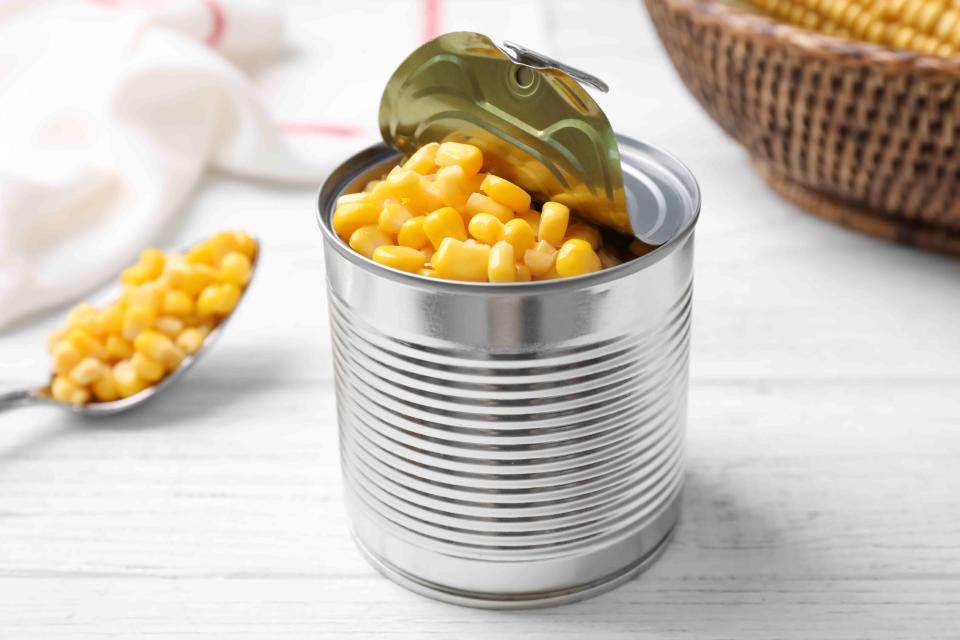Are Dented Cans Safe To Use?
When in doubt, throw it out.

Getty Images
We have all been in a situation where, after reaching into the pantry, we discover the canned food we planned on using has a dent in the side. Instead of tossing the can aside, you may wonder: Are dented cans safe?
When it comes to dented cans, the size of the dent is what’s important in determining the safety of eating from a dented can. Alabama-based dietitian Chelsea Edwards tells Southern Living that food from cans with small dents is generally safe to eat, while cans with bigger dents should be discarded.
"Bigger dents, such as those you can lay your finger in, are more risky, so it is not recommended to eat food from those cans," she says.
Edwards adds that cans with dents that feature pointy edges and dents on the seams of cans are considered to be more risky.
So, what’s the issue with dented cans? The biggest hazard associated with dented cans is botulism, a toxin that attacks the body's nerves. The bacteria Clostridium botulinum produces botulinum toxin which leads to botulism in humans.
Edwards explains that symptoms of botulism toxin are difficulty speaking or swallowing, facial weakness, and paralysis, and emergency medical care is required.
"'When in doubt, throw it out' is a great phrase to keep in mind when it comes to food safety," she says.
Meet Our Expert
Chelsea Edwards is a registered dietitian and the owner of Huntsville Nutrition Collective in Huntsville, Alabama.
Are Dented Cans Safe To Use? A Guide To Canned Food Safety
The U.S. Department of Agriculture (USDA) advises consumers to throw away "deeply dented" cans.
“If a can containing food has a small dent, but is otherwise in good shape, the food should be safe to eat,” the website states.
Warning Signs a Can of Food Is Unsafe
Perhaps your can was only slightly dented, but upon opening, something seems a little off, or maybe you can’t be sure if the food is safe based on dent size. Edwards advises that if there is leaking, bulging, or the container appears swollen, it should be tossed. Additionally, cans with deep or pointy dents signal a canned food is likely no longer safe to consume.
Edwards adds, "If the can gushes liquid or foam when opened, it is likely unsafe to eat."
Related: How Long Does Canned Food Really Last?
Signs of Botulism in Canned Food
Edwards says you cannot see, smell, or taste the toxin that causes botulism, and the best way to avoid it is to pay close attention to how the can looks.
“The can's external appearance, as well as any liquid or foam that seems pressurized upon opening, are your best indicators,” she says.
The USDA says consumers can avoid botulism by:
Carefully inspecting frozen, fully-cooked products.
"If the package is punctured, torn, partially opened, or damaged in any way that might expose the contents to the outside environment, do not purchase," the website states.
When you open the container, inspect the product.
"Do not use products that are discolored, moldy, or have an off odor. Do not use products that spurt liquid or foam when opened. Do not taste the product to determine if it is safe," the website states.
Related: Should You Drain Canned Vegetables?
Can Cooking Canned Food Remove Potential Hazards Caused By Dents?
Edwards says that acidic foods are less likely to have botulinum toxin as the toxin cannot survive in acidic conditions, though they can still have food borne illnesses from spoilage in the can.
“Boiling a canned item for five minutes once opened can kill the botulinum toxin spores, but ready-to-eat foods are the most common cause of botulism due to the foods not being boiled before consumption,” she says.
For more Southern Living news, make sure to sign up for our newsletter!
Read the original article on Southern Living.

